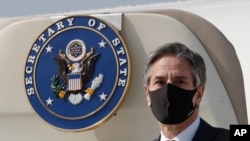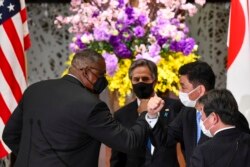U.S. Secretary of State Antony Blinken and Defense Secretary Lloyd Austin are heading to South Korea Wednesday after warning China the Biden Administration will respond to Beijing’s use of coercion and aggression in the region.
Blinken and Austin left Tokyo earlier in the day after holding joint “two-plus-two” talks with Japanese counterparts Toshimitsu Motegi and Nobuo Kishi aimed at reaffirming the trans-Pacific partnerships in the face of an increasingly assertive China and hostile North Korea.
In a joint statement after the meeting, Blinken pledged that the Biden administration will “push back, if necessary, when China uses coercion and aggression to get its way.”
In remarks before a separate meeting between he and Motegi, Blinken said that Washington and Tokyo believe in “democracy, human rights and the rule of law,” but said those values are “under threat” in the region,” whether it’s in Burma or China,” using Myanmar’s alternative name in referring to the coup in that country.
Motegi said later that he and his American counterpart are both opposed to China’s attempt to change the status quo in the East and South China Seas, where it has aggressively expanded its military presence and claimed territorial rights to much of the region.
In Beijing, Chinese Foreign Ministry spokesman Zhao Lijian told reporters that U.S.-Japan ties should not “target or harm the interest of third parties,” urging the two sides to “contribute to solidarity and cooperation, as well as peace and stability in the Asia-Pacific region.”
Relations between the world’s two largest economies are at a low point thanks in part to a trade war that former President Donald Trump initiated as well as rising military tensions in areas that China regards as its sphere of influence.
Less than two months into his presidency, Joe Biden has signaled he is in no hurry to relieve some of the pressure that his predecessor placed on Beijing. His administration has maintained import tariffs, voiced support for Taiwan’s democratic government and condemned President Xi Jinping’s alleged human rights abuses in Hong Kong and Xinjiang. China's Xinjiang region has been the center of allegations of forced labor and other human rights violations.
Last week, the White House released its national security strategy document that described China as “the only competitor potentially capable of combining its economic, diplomatic, military, and technological power to mount a sustained challenge to a stable and open international system.”
Despite the new administration’s tough stance, Washington is signaling that it is still open to dialogue with Beijing.
Secretary Blinken and White House national security adviser Jake Sullivan are expected to meet later in the week with Wang Yi, China’s foreign minister, and chief diplomat Yang Jiechi in Anchorage, Alaska, the first time since last June that officials from both countries have held bilateral talks.
Ahead of the meeting between Blinken and Wang, the United States sanctioned 24 Chinese officials over Beijing’s continuing crackdown on Hong Kong’s democratic freedoms. Among those sanctioned Wednesday was Wang Cheng, a member of China’s Communist Party 25-member Politburo.
The sanctions were issued under the Hong Kong Autonomy Act, which U.S. lawmakers approved last year in response to China’s approval of a new draconian national security law imposed on the semi-autonomous city that has suppressed pro-democracy forces. The act prohibits designated officials from doing business with U.S. financial institutions and from traveling to the United States.
North Korean silence
Finding common ground on how to coerce the Kim Jong Un regime back to dialogue is another priority for Blinken and Austin during their four-day Asian trip.
President Biden has yet to announce his strategy toward North Korea, but a policy review is underway.
Since February, the Biden administration has attempted to contact Pyongyang through several diplomatic channels but has not received any response, according to an unnamed U.S. official who spoke with the Reuters News Agency.
The silence was broken Tuesday when Kim Yo Jong, the influential sister of North Korean leader Kim Jong Un, issued a statement ahead of Blinken and Austin’s talks in Tokyo accusing the Biden administration of being eager “to spread the smell of gunpowder on our land from across the ocean.”
Kim Yo Jong also warned the new administration to “refrain from causing a stink” if it didn’t want to “lose sleep” over the next four years.







